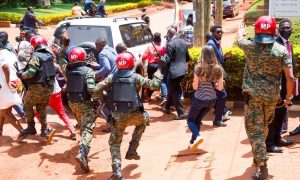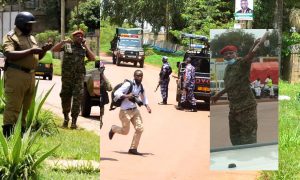
South Sudan’s rebel leader Riek Machar speaks to the media about the situation in South Sudan
The Media Authority has banned about twenty foreign journalists from entering or operating within the country for reporting what it termed “unsubstantiated and unrealistic stories”, the Managing Director of the regulatory body has said.
Early, the chairman of the communications department in the secretariat of the steering committee of the national dialogue, Alfred Taban said that Media Authority has no right to bans Journalists.
“The Media Authority law does not give this body the right to deny visas to Journalists on the ground that they write articles critical of the government,” Alfred said.
Elijah Alier told Eye Radio that most of the Journalists prohibited from covering issues in the country have often reported stories that have the potential to incite hate and violence among South Sudanese.
He said that some of the reports do not have reliable sources or specific locations, but generalize events and people in the country.
Journalists, he said, have written stories that insult or degrade the country and its people, and often portray nonentity acts to justify the lifestyle of the people of South Sudan.
Mr. Alier said the reports sometimes advance violence rather than encourage the public to embrace peace.
He added that some of the reports have violated provisions of the Media Authority Act.
“Issues to do with hate speech, incitement to violence and disinformation are not acceptable in the context of our law. Some of the reporters have not even been seen in South Sudan, you need to respect also the country, you can’t just label the country as crazy,” Alier said.
The official of the Media Authority said they don’t have issues with journalists reporting on facts about the country.
He said it is the unverified information which often leads to panic and increases instability in South Sudan, that they pick issue with.
“Reporting about the humanitarian situation is a reality. Such reports are helping South Sudan at some point; they are informing the world and the donor community,” Alier said.
Mr. Alier, however, said the Media Authority has issued over 200 permits to foreign Journalists and media houses to operate in South Sudan.
He said most of these Journalists will help in relying on vital information during the process of the National Dialogue.
He urges foreign Journalists to seek accreditation such as a permit from the Media Authority to enable the body to facilitate their work.
Alfred Taban who is also the Chairman of Association for Media Development in South Sudan accused Media Authority of sabotaging national dialogue.
“Why does the Media Authority want to sabotage this major countrywide enterprise? Alfred paused a question in his column – Let us speak out – that appears in Juba Monitor.
Mr. Alfred says President Kiir has assured the national dialogue committee that Journalists are free to come to the country.
“The president has assured us that all the people coming to the country especially Journalists will be given full freedom to move freely,” he said.
By refusing entrance into this country, he said, the Media Authority has given the impression that the government has something, maybe a lot, to hide.
Eye Radio









